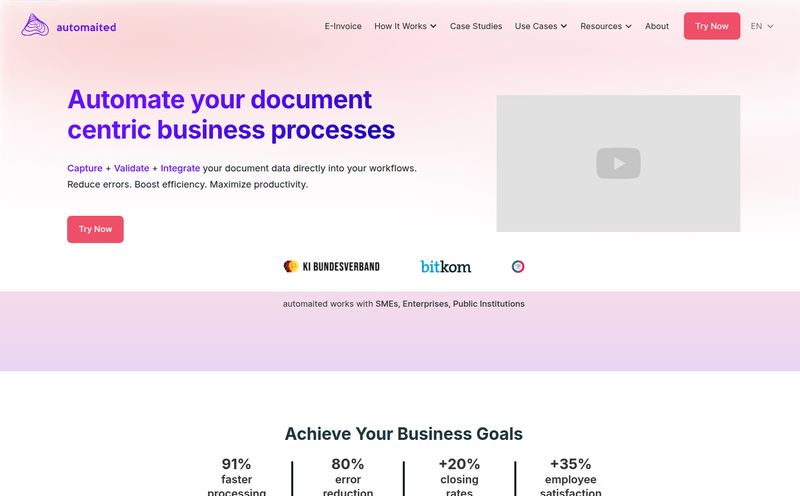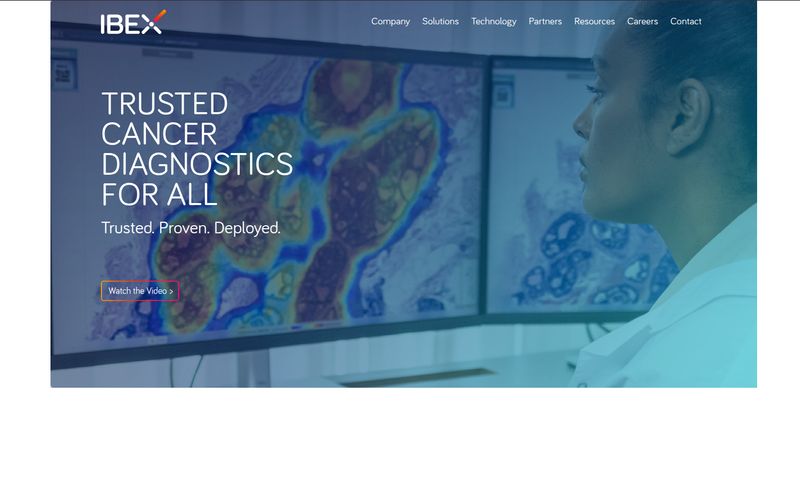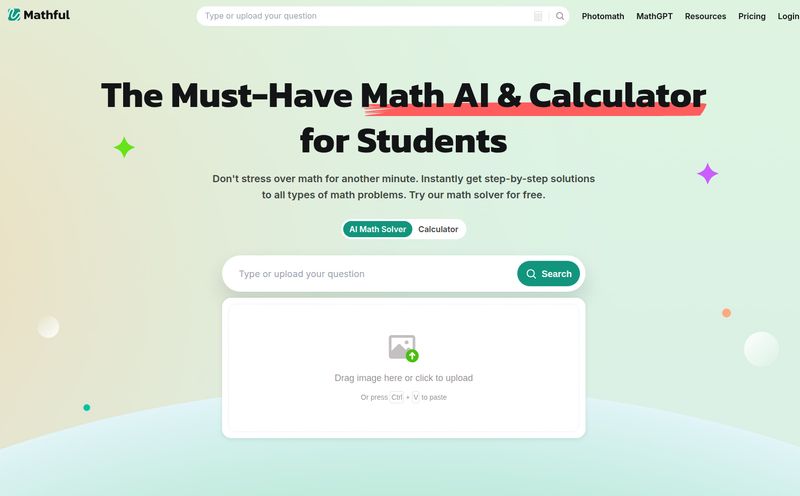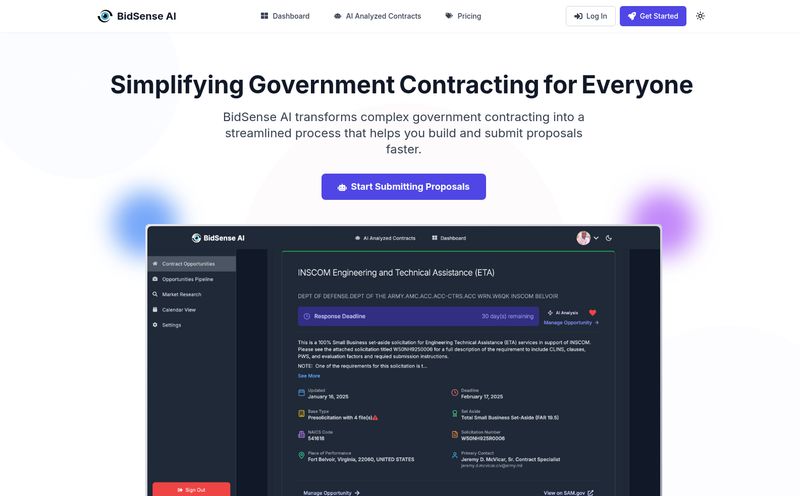If you’ve been in recruitment for more than a week, you know the feeling. You post a great role, and the floodgates open. Suddenly, your Applicant Tracking System (ATS) looks less like an organized database and more like a digital landfill. Hundreds of resumes, and you have to sift through every single one, your eyes glazing over, fueled by lukewarm coffee and the fear of missing that one perfect candidate. I've been there. I’ve spent entire Mondays just trying to clear a weekend’s worth of applications, feeling more like a data entry clerk than a strategic talent partner.
The old way of doing things—relying on basic keyword filters in our trusty-but-clunky ATS—is broken. It’s how you miss the brilliant candidate who called themselves a “Growth Hacker” instead of a “Marketing Manager.” It’s how you overlook potential because a resume wasn’t perfectly optimized for your specific search terms. It’s frustrating.
Recently, a new tool called ZYTHR popped onto my radar, with the bold tagline, “Stop Drowning in Applicants.” Okay, you have my attention. I'm always a bit skeptical of new AI-powered saviors, but this one seemed to be tackling the problem from a different angle. So, I took a closer look.
What Exactly is ZYTHR? (And Why It Isn't Just Another ATS)
First thing's first: ZYTHR isn't here to replace your current ATS. Thank goodness. The last thing any of us need is another massive system migration. Instead, think of ZYTHR as a super-smart upgrade for your existing system. It integrates directly with your ATS and acts as an intelligent analysis layer on top of it. It reads, understands, and prioritizes the candidates you already have.
Its main job is to automate the most soul-crushing part of our work: the initial resume screening. By using Natural Language Processing (NLP) and machine learning, it aims to free up recruiters to do the stuff that actually matters—building relationships, conducting meaningful interviews, and creating a memorable candidate experience. You know, the human stuff.
Moving Beyond Keywords: The ZYTHR Difference
Here’s what really caught my eye. We’ve all been burned by keyword-based screening. It's a blunt instrument. It searches for specific words and phrases and discards the rest. ZYTHR claims to perform a holistic candidate evaluation. It doesn't just scan for keywords; it reads the entire resume, cover letter, and even your own recruiter notes to build a complete picture.
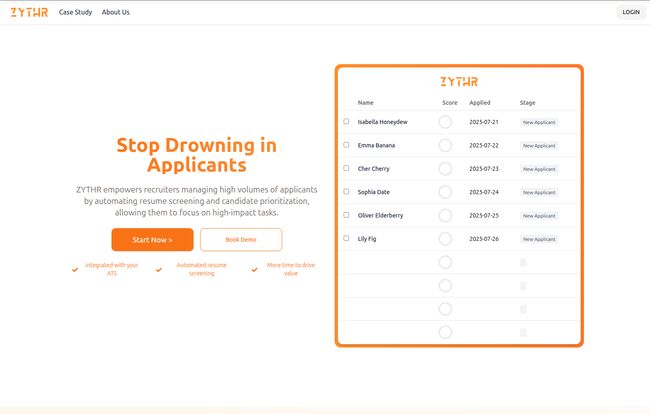
Visit ZYTHR
Imagine your old ATS is like a librarian who can only find books by searching for exact titles. If you ask for a book on “growing a company,” but the best one is titled “Startup Scaling,” you’re out of luck. ZYTHR is like the librarian who has actually read every book in the library. It understands context and implied skills. The example on their site is perfect: if a resume lists a past role as “CEO,” the platform can infer skills like leadership, strategic planning, and financial management, even if those words aren't explicitly written down. A total game-changer.
This approach means it can find those hidden gems—the candidates with transferable skills or unconventional backgrounds that a keyword search would have immediately tossed aside. And let's be real, in this market, those are often the best hires.
How ZYTHR Fits Into Your Current Workflow
The promise of “seamless integration” always makes my eye twitch. I’ve seen too many “seamless” projects turn into month-long IT nightmares. But ZYTHR's process seems refreshingly simple: Sign up, connect your ATS, and run the analysis. Because it’s a layer, not a replacement, the setup is supposed to be minimal. All your candidate data remains in one place, just... smarter.
A Deeper Look at the Analysis
So what is it actually looking for? It's not some black box algorithm making random decisions. The platform evaluates candidates against the specific criteria that matter for the role. This includes required qualifications from the job description, of course, but also preferred skills like team collaboration or specific technical proficiencies. It considers years of experience, relevant industry exposure, and even leadership qualities. It’s basically doing the detailed first-pass review you would do, just in seconds instead of hours.
Real-World Wins: What Recruiters Are Saying
I’m a big believer in social proof. It’s one thing for a company to talk about its features, but it’s another to hear from people in the trenches. The quote from Melina Verka Nadie, a Head of HR, really stood out to me. She said, “ZYTHR helped us discover a great candidate who applied late, and he got the job—someone we likely wouldn't have found otherwise! Plus, I'm not spending 5 hours a day sifting through resumes.”
That hits on the two biggest value propositions right there: finding better candidates and saving a ridiculous amount of time. Finding someone you would have missed? That's ROI right there. And getting five hours back in your day? That’s not just a win-win; it’s life-changing for a busy recruiter.
Let's Talk Brass Tacks: Potential Downsides and Pricing
No tool is perfect, and it’s important to look at this with open eyes. The biggest potential issue is the classic “garbage in, garbage out” problem. ZYTHR's effectiveness is going to depend heavily on the quality of your inputs—namely, a well-written job description and clear recruiter notes. If your JD is vague, the AI's analysis will be too.
There's also the human element. Relying on AI might cause some to worry about overlooking nuanced qualities that a human eye might catch. While ZYTHR seems more advanced than most, it’s still a tool to assist, not replace, a recruiter's intuition.
Now, for the big question: what does ZYTHR cost? As of now, they don't list pricing on their website. This is pretty common for B2B SaaS platforms that target enterprise clients. It usually means pricing is customized based on company size, applicant volume, and the specific ATS integration needed. To get a number, you’ll have to book a demo or talk to their sales team. A bit of a hassle, but standard practice.
Frequently Asked Questions About ZYTHR
Does ZYTHR replace my current Applicant Tracking System (ATS)?
No, it doesn't. ZYTHR is designed to integrate with and enhance your existing ATS. It acts as an intelligence layer on top of your current system, so you don't have to migrate your data or learn a whole new platform from scratch.
How does ZYTHR handle potential AI bias in hiring?
This is a huge topic in HR tech. ZYTHR aims to reduce bias by focusing on skills, qualifications, and experience outlined in the job description and resume content, rather than relying on proxies for success that can be discriminatory. By moving beyond simple keyword matching, it can actually create a more equitable review process than a biased human screener or a primitive filter. However, ensuring your job descriptions are written inclusively is still a critical step.
Is it difficult to set up?
According to ZYTHR, the setup process is designed to be straightforward with minimal IT involvement. The three main steps are signing up, connecting your ATS through their integration process, and running the analysis. It's meant to be a low-friction implementation.
What kind of roles is ZYTHR best for?
The platform is most valuable for recruiters who manage high volumes of applicants for a single role. Whether it's for tech, marketing, sales, or administrative positions, if you're feeling overwhelmed by the number of inbound resumes, ZYTHR is designed to solve that specific pain point.
Can I try ZYTHR before committing?
Yes, their website features prominent calls to action to “Book a Demo” and “Start Now.” This suggests you can get a personalized walkthrough to see if its a good fit for your team before making any commitments.
My Final Thoughts on ZYTHR
So, is ZYTHR the magic bullet that will solve all our recruiting woes? Probably not. But is it a massive step in the right direction? Absolutely. The idea of reclaiming hours of my day while simultaneously getting a better, more holistic view of my candidate pool is incredibly appealing.
I’ve always said that technology should handle the repetitive, administrative tasks to free up humans to do what they do best: connect, empathize, and make strategic decisions. ZYTHR seems to be built on that exact philosophy. For any recruiting team that feels like they’re constantly playing catch-up and fighting their own ATS, it’s definately worth a look. It might just be the life raft you've been looking for.
